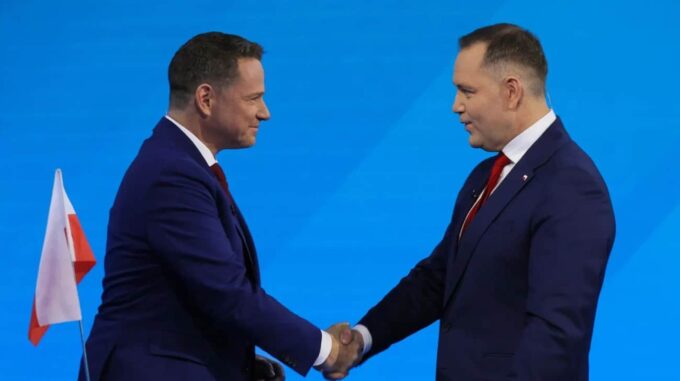In Polish Presidential Debates: Sharp Discussions on Ukraine, Zelensky, and International Politics

The evening of May 23 was marked by tense televised debates among Polish presidential candidates, during which for the first time in a campaign discussion, issues concerning Ukraine, its relations with Poland, and the role of Ukrainian leader Volodymyr Zelensky were discussed in a particularly sharp and detailed manner. This dialogue, which captured the attention of a broad audience, drew the interest of experts and political analysts due to its unpredictability and significance for the future of the region. The fierce polemics were initiated by candidates representing different political forces. Opposition candidate Karol Nawrótki, supported by opposition groups, criticized Zelensky's attitude towards Poland, noting that his stance is insufficiently friendly and open. Nawrótki emphasized that the approach applied to Polish-Ukrainian relations was characterized by what he called a "bad attitude," hinting at potential negative impacts on Polish interests. Conversely, the government-backed candidate, Radosław Trzaskowski, accused Zelensky of allegedly speaking "with Vladimir Putin's language" regarding Ukraine's NATO accession. Trzaskowski approached the topic with humor yet was firm in opposing concepts that, according to him, undermine Ukraine's prospects on the international stage, particularly concerning security and Euro-Atlantic integration. Both candidates posed three questions to each other across six thematic blocks—ranging from the economy to social policy, with a special focus on migration and Polish-Ukrainian relations. Migration issues dominated almost the entire discussion, a topic long considered a hot-button issue in Polish politics and media. Both candidates unanimously distanced themselves from the so-called EU Migration Pact, with Nawrótki confirming that if elected, he would unilaterally raise the issue of repealing this agreement. Trzaskowski, in turn, stated that the pact would "never come into force" because of the assistance Poland has already provided to Ukraine in humanitarian and military support. Nawrótki challenged these statements, arguing that when the relevant document was adopted in 2015, a large-scale conflict in eastern Ukraine had not yet occurred. A special segment was dedicated to security issues. Trzaskowski questioned Nawrótki about his regional stance on Ukraine's NATO accession and accused him of holding views similar to "Vladimir Putin’s language." In response, Nawrótki emphasized that his statements reflect a consistent Polish position and added that if Zelensky and other Ukrainians have a poor attitude towards Poland, the Polish people have the right to speak about it openly. He pointed out that millions of Poles in Poland do not have the chance to voice their opinions out of fear of being accused of "Putin propaganda." Regarding relations with the United States, Trzaskowski expressed that he has never spoken negatively about former President Donald Trump and even has "sensational connections" with Republicans. He highlighted that Trump values "tough, strong, and influential" leaders capable of defending the interests of the U.S. and its allies. Nawrótki, in turn, acknowledged that Trump favors "strong and influential men" who speak "with the voice of their people" and stand up for their positions. The background of these debates began with the results of the first round held on May 18. According to the results, Warsaw Mayor Radosław Trzaskowski, the candidate from the ruling party, received 31.36%, and Karol Nawrótki, head of the Institute of National Remembrance of Poland and opposition candidate, gained 29.54%. Supporters from both camps are preparing for the decisive runoff vote, which will be crucial for shaping the country’s future course on strategic issues in international politics and domestic reforms. The initial results and the silent struggle for an independent stance and national security create a complex and tense atmosphere ahead of the elections. It is important to note that the topic of Ukraine, its security, and Poland’s relations with Kyiv will continue to be central to future political discussions and decision-making in Poland. These debates once again demonstrated that questions of foreign policy, international relations, and balance on this front remain the most contentious and capable of eliciting emotional tension. It is not excluded that the political struggle around these topics will determine the course of future elections and influence Poland’s foreign policy in the coming years.

